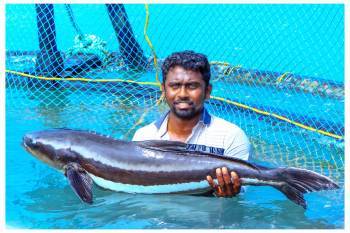KOCHI, 28 March 2023: Mariculture has emerged as a promising business opportunity for India’s coastal regions, offering decent income to the coastal people even as extreme weather events like cyclones are leading to the reduction of fishing days every year, according to a new study by the ICAR-Central Marine Fisheries Research Institute (CMFRI).
Cage fish farming in the open sea and coastal waters could yield an additional income of up to INR 3 lakhs per unit, the study found. The study examined the social, environmental, technical and economic aspects of 159 mariculture units such as cage farming, seaweed cultivation and Integrated multi-trophic aquaculture (IMTA) six coastal states including Kerala.
The innovative practice of IMTA, which combines mussel or seaweed cultivation with cage fish farming, was found to generate even higher profits of INR 3.25 lakhs per unit.
Higher profitability for coastal water cage farms in Kerala
Kerala exhibited higher profitability in coastal water cage farming compared to other coastal states, with nearly 40% of such units in the state generating an income ranging Rs. 2 lakhs to 3 lakhs per season. Andhra Pradesh realised greater profitability in open sea cage farming while the IMTA practice was found to be more profitable in Tamil Nadu.
The study titled Sustainable intensification of small-scale mariculture systems: Farm-level insights from the coastal regions of India was published in the international research journal Frontiers in Sustainable Food Systems.
Employment Prospects
The study led by Dr Shinoj Parappurathu, Senior Scientist of the CMFRI also highlighted that mariculture augmented employment and gender inclusion among the coastal communities across the country. Marine cage farming and the IMTA generated 175-396 person-days of employment from one unit in a season lasting around 8 months. Employment estimates vary across enterprises and locations.
The usage of antibiotics was not reported in any of the farms. However, many farmers practicing coastal water cage farming in Kerala were found to be overstocking their cages. Seaweed cultivation along potential farming sites was found to be highly prospective, given the increasing demand for seaweed-based products for culinary purposes and pharmaceutical and other industrial uses.
The CMFRI study also identified challenges in the sector, including the scarcity of quality seed and feed. Less than 50% of farmers received good-quality seed for culture. Limited access to institutional credit to meet capital and the operational cost was reported to be another major constraint in the sector.
Legislation
“Adequate legislative mechanism is required to ensure legitimate access for farmers to open water bodies. Respective state governments should intervene to provide this protection to farmers so that production could be augmented”, Dr Shinoj Parappurathu said.
The lack of legislative provision puts this prospective sector under the shadow of uncertainty, ultimately hindering large-scale business plans in mariculture, he added.
Food safety protocols
The study proposes strengthening food safety protocols and health management systems in mariculture farms; developing marine spatial plans for the optimal allocation of available ocean space; bringing about market reforms for the development of competitive value chains; introducing specialised schemes to support auxiliary prerequisites such as credit, insurance, and other support services; adopting measures to ensure adequate supply of seed and feed through channelizing public funding and by incentivising private sector; promoting group farming, cooperative farming and farmer producer companies among mariculture farmers; and developing mandatory guidelines on good farming practices such as anti-fouling, water quality monitoring, crop holiday management, etc.
Image caption: A fish farmer with cobia fish harvested from sea cage farming




















